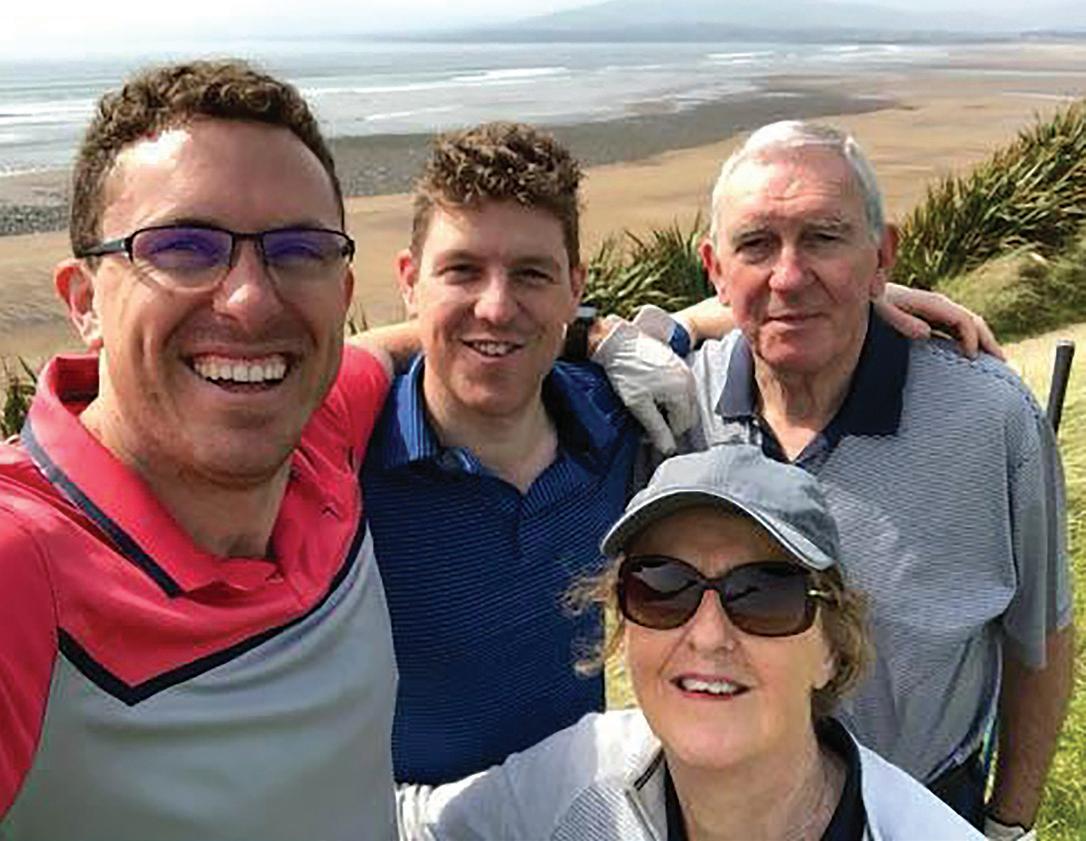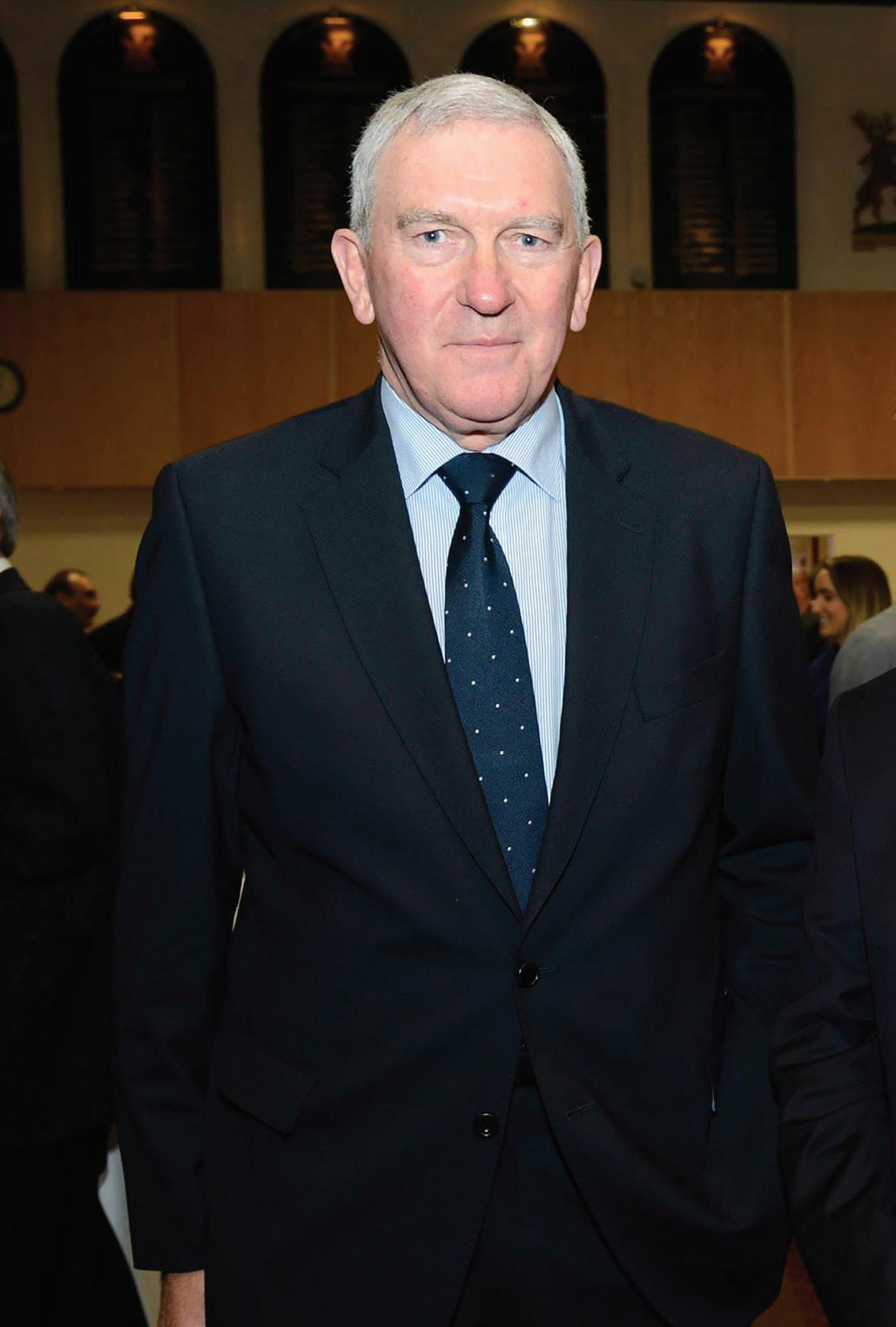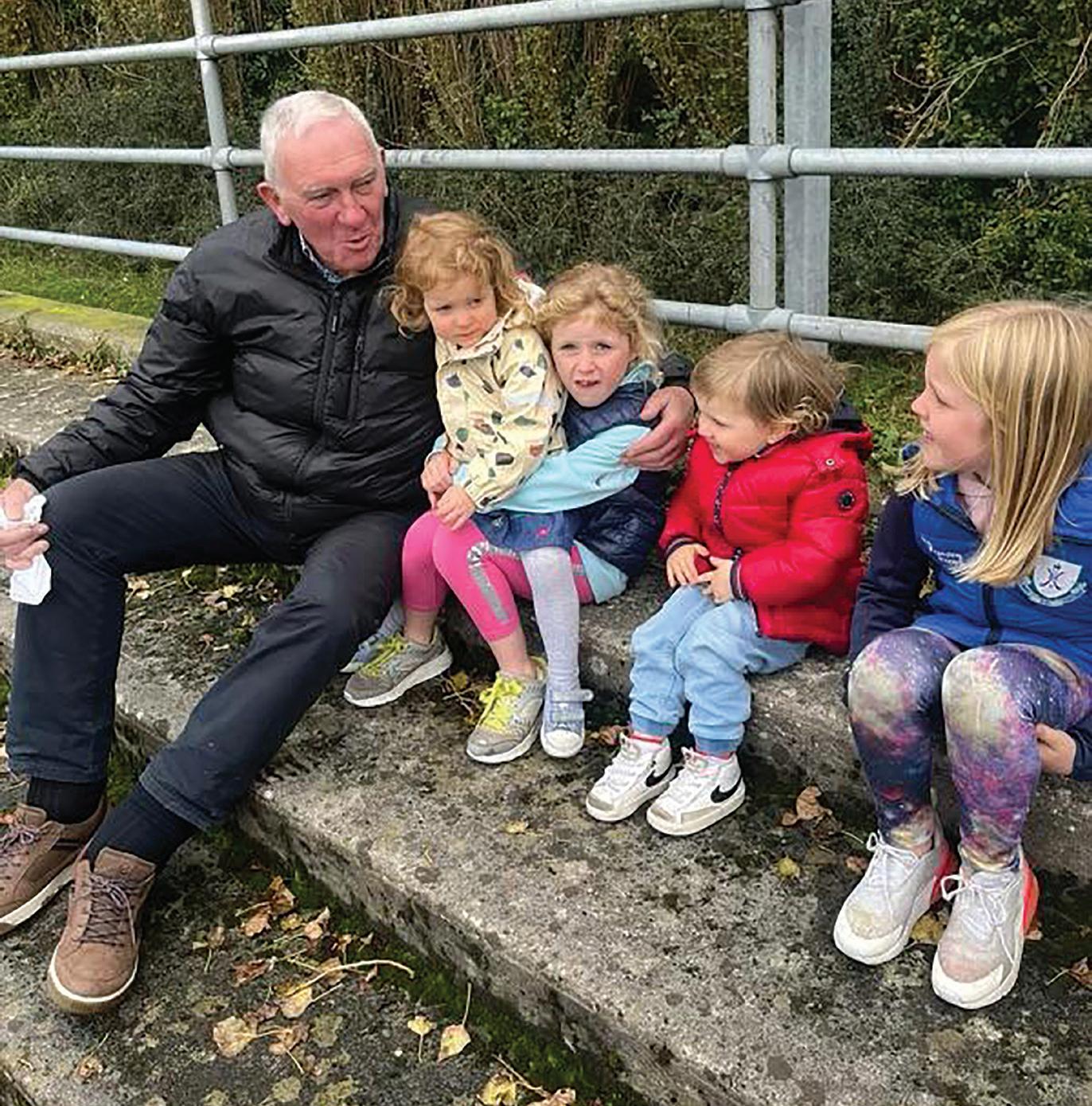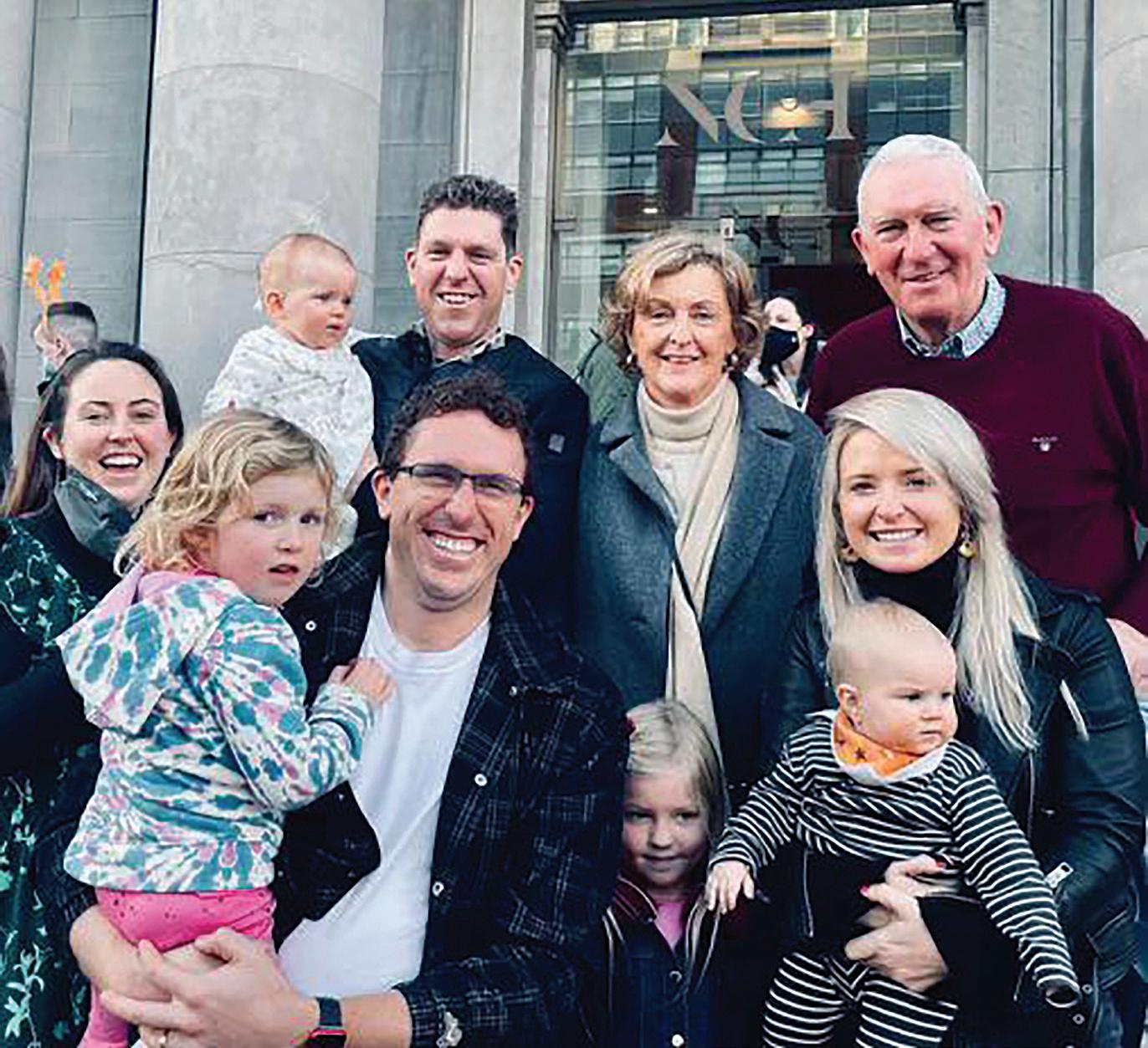
10 minute read
Back to the Beginning
by RCSI
BACK TO THE BEGINNING
Mr Aongus Twomey FRCSI is a Consultant General Surgeon with a specific interest in urology. After six years in the UK, he worked for many years at Mercy University Hospital in Cork and outside of his clinical practice was, and still is, an active member of the Irish Surgical Travellers Club
Born in Cork City, Aongus Twomey grew up in Mallow where his father, Tadhg, a scientist with a PhD from University of Galway, was the manager of the town’s sugar factory. His mother, Maeve, was a doctor who had trained as an anaesthetist in the UK and worked part-time throughout his childhood.
Aongus is the middle child of five, though his younger brother, Feargal, sadly died as the result of an accident at the age of eight when Aongus was twelve. He initially attended Dromahane National School outside Mallow and later moved to the Patrician Brothers National School in the town. He attended Coláiste na Rinne at Ring, Co Waterford, for a year before boarding at Glenstal in Co Limerick.
“My parents’ priority for us was education,” he recalls. “All their money was invested in us. We had many happy summer holidays in Ballybunion where we made lifelong friends and great memories. They gave us the best possible education.”
Aongus remembers there being plenty of ‘medical speak’ in the house when he was growing up. His older brother, Cillian, who became a geriatrician, and sister, Fiodna, who became a public health doctor, went to medical school before he did. His younger sister, Aifric, is an advanced nurse practitioner in emergency medicine in Scotland.
“Growing up, I always wanted to be a doctor and in particular a GP,” says Aongus.
Aongus attended medical school at UCC graduating in 1973, and then completed his intern year at University Hospital Kerry, which was then called St Catherine’s.
“By that stage I had a yen to become a surgeon,” he says, “but the exams were very difficult, consultant posts were thin on the ground and it was all very competitive. I wasn’t sure that I would make it.”
Instead, he opted to do GP training and did a few GP locums in Cork and Kerry. While he found the work interesting, he had a sense of being very isolated, and became increasingly aware of the huge burden of responsibility borne by GPs, particularly those working in single doctor practices.
His years in general practice gave him an insight into that world, but Aongus eventually decided to pursue a career in surgery.

“At that time, the initial training took three years,” he says. “I spent the first two years doing basic training in neurosurgery, orthopaedics, general surgery and A&E at Cork University Hospital and its associated hospitals, and I followed that with a year as a junior registrar. I had very supportive mentors in Cork including Professor Michael Brady, the late Professor Liam Kirwan, Professor Gerald O’Sullivan and Mr Joe O’Donnell. They were very encouraging and maintained contact and involvement all the way through my career.
“There were very few higher training posts available in Ireland at that time and most of us went abroad. I had married Eileen Murphy from Cork City who had been a couple of years behind me in UCC. She had completed her membership in medicine but being a pragmatist, switched paths to radiology which she felt would offer us more options.”
The couple moved to London when Eileen secured a training post in radiology at Northwick Park Hospital in Harrow.
“I had no job when we travelled over,” recalls Aongus, “but after a few days I secured locum work at Northwick Park and after a short while my career took off. I was very fortunate. I also worked in the West Middlesex Hospital in Isleworth, and in the then-new Charing Cross Hospital. We had a wonderful time in London and spent six years there, during which time our sons Michael and Conor were born.

"I do feel that surgery is very specialised now but that not every patient needs a specialist and our peripheral hospitals need to be staffed by well-trained general surgeons who know what they can do safely and what they can’t...”
“In Northwick Park, there were four general surgeons, each with a specific interest. I held registrar and senior registrar posts in general surgery and subsequently in urology. At the time there were very few urologists in Ireland, but there were lots of patients with urological problems in Irish hospitals. Because of this, those with similar training to me were appointed as consultants to various hospitals around the country to meet this need. Subsequently, specialist training for urologists was introduced but that didn’t exist at the time.
“I do feel that surgery is very specialised now but that not every patient needs a specialist and our peripheral hospitals need to be staffed by well-trained general surgeons who know what they can do safely and what they can’t. When I interviewed for the job in Mallow the first question I was asked was: ‘What operations are you not going to do in Mallow?’ I said I wouldn’t do oesophageal, low rectal, elective vascular, reconstructive urology in children or cystectomy operations. I’d say that got me the job. I think knowing your limitations demonstrates good clinical judgement.”
Interestingly, Aongus notes, there were 16 applicants for the Mallow job. “Different times indeed!”, he says.
Aongus, Eileen and their two sons returned to Mallow in 1986, and he worked there for the next 34 years. For the first 25 of his years at Mallow, Aongus was on a 1-in-2 call rota and for the remainder it was a 1-in-3, a huge improvement.
“We had no registrars and so all surgery was done by the consultants themselves, which was hard work for the consultants but very good for the patients,” says Aongus. “Working in a peripheral hospital on a 1-in-2 rota can be challenging. It was certainly very tough for my family. We lived in Mallow initially and then moved to Cork, 20 miles away. I liked the commute, because in the morning it gave me time to prepare for the day ahead, and on the way home it was an opportunity to debrief and process how the day had gone.”
During his time in Mallow, hardly a single day passed that he didn’t get a call from a GP concerned about a patient.

“I always took the calls and tried to help. If it was an emergency, I could advise the GP to send them in or, if it was less urgent I could see them in clinic. It was important to me that the GPs felt comfortable ringing and I was very conscious it was much easier for me with the hospital back-up than for the GP out on their own.”
Mentoring in surgery is very important and I think it is not as strong as it was in my day, it has been diluted in recent years. It’s still hugely important and should not be allowed to disappear.”
In 2012, emergency surgery ceased in Mallow. Aongus was appointed to the Mercy University Hospital in Cork but continued to do non-emergency work in Mallow as well, retiring from Mallow in 2020.
“The Mercy asked me to stay on after that and I am still there,” he says. “I work part-time and have done no ‘on call’ since 2022. I do a full day list on a Monday, an outpatient clinic on a Tuesday and I visit inpatients on the other days. I also spend time teaching, mentoring and examining. It works out at two and a half days spread across the week and I find it very rewarding. The Mercy is a fantastic hospital and I have excellent colleagues in surgery, anaesthetics, radiology and ICU. In ways, starting at the Mercy was a new beginning for me and it has been an absolute joy. I very much enjoy the engagement with the trainees and students. I like structure in my life, and the fact that I can still make a contribution.”
Outside of his clinical practice, Aongus has been an active member of the Irish Surgical Travellers Club since 1998, serving as its president in 2012.
“The society was founded in 1954 and has about 30 members,” he explains. “We meet twice a year and each year we go abroad to visit a hospital overseas. Professor Gerald McGreal is this year’s President and recently we travelled to Toronto to visit Toronto General Hospital. When I was President in 2012 I brought the group to Boston visiting Massachusetts General, the Brigham and Women’s Hospital and Beth Israel Hospital. We were very well received and had a great time.”
“My membership of the Surgical Travellers Club has created fantastic connections with other specialists around the country and with colleagues who worked a 1-in-2 rota, as I did. The opportunity to visit operating theatres abroad and see different operations and new innovations has been wonderful. It’s reassuring when you see how people do things elsewhere and realise the way you’ve been doing things is not so bad. Surgery is a discipline of confidence and competence, and both are equally important.”
Reflecting on a long and fulfilling career, Aongus observes that he has seen very many changes over the years in the practice of surgery.
“I suppose the biggest was the change from open to laparoscopic surgery. Many of us were used to doing ‘oscopies’ already so that transition was not particularly difficult. Surgical instruments have improved and there have been enormous advances in intravenous nutrition, to the benefit of patients in recovery from surgery. I welcome the advent of the multi-disciplinary team and meetings and that most surgeons no longer work in isolation. Help is always available. The best piece of advice I could give a surgeon who is in a dilemma is to pick up the phone and ring a colleague. Mentoring in surgery is very important and I think it is not as strong as it was in my day, it has been diluted in recent years. It’s still hugely important and should not be allowed to disappear.”
Aongus is pleased to see more women joining the surgical training programmes in all disciplines.“In my experience they are very bright, hugely committed and hard working, they are very much part of the future of surgery and the College needs to help and support them in every way possible.”
Now that they have a little more free time, Aongus and Eileen, who retired a few years ago, enjoy walking, music and playing the odd round of golf. They travel often to visit their sons and their families – Michael is a solicitor in Dublin and has three children, and Conor works in AI in New York and has two children.
“I could not have had the career I have had without the support of Eileen, who worked part-time, and my children, siblings and mentors. We adore our sons, daughters-in-law and grandchildren and our life is all about them now. I wake up every day thinking how lucky I have been and I am very grateful. I have no regrets and would do everything exactly the same way again. I feel very privileged to be a surgeon.” ■


